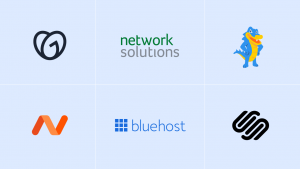Key takeaways:
- A .app domain helps communicate innovation, security, and professionalism. It’s a strong fit for developers, startups, and brands that want to be recognized as tech-forward and future-ready.
- The .app domain is used to clearly signal that a website offers technology-related products, services, or personal portfolios, emphasizing innovation, digital tools, and built-in security.
- Selecting the right TLD is essential to aligning your domain with your brand’s goals and audience. Consider how each extension shapes perception and visibility before finalizing your choice.
In recent years, the .app domain has gained popularity, particularly among developers and businesses in the tech industry, thanks to its focus on security and relevance to apps and software. While the TLD is not exclusive to tech-related businesses, it’s not always the best fit for every venture.
With so many top-level domains (TLDs) to choose from, like .com, .net, .io, and .app, it’s important to select one that fits your goals and resonates with your target audience.
This TLD (top-level domain) is managed by Google and focuses on security and innovation. While anyone can register it, it’s most effective for brands with digital or software products.
In recent years, the .app domain has become popular among developers, tech startups, and businesses offering mobile or web applications.
This TLD (top-level domain) is managed by Google and focuses on security and innovation. While anyone can register it, it’s most effective for brands with digital or software products.
In this article, we’ll explore what are domains, the meaning of the .app domain, its pros and cons, and how it compares to other TLDs. We’ll also guide you how to register your own .app domain and find the perfect website domain name for your business.

What is a .app domain?
The .app domain is a top-level domain or domain extension that was developed by the Internet Corporation for Assigned Names and Numbers (ICANN) in 2012. Three years later, it was acquired by Google through an auction, and they opened the TLD for public registration in 2018.
Like the most generic domain extensions, .app can be registered by anyone. However, since the TLD itself is associated with the term ‘app’ or application, most registrants are web and software application companies operating within the tech landscape.
Example: A mobile fitness startup could use “fittrack.app,” while a language-learning service could go with “learnsmart.app” to highlight its digital nature.
What is the .app domain used for?
The .app domain is versatile yet specialized. It’s ideal for businesses that want to communicate innovation, technology, and security.
eCommerce and SaaS
Online stores, SaaS providers, and digital marketplaces can use .app to instantly show they sell or support software-based tools. The digital marketplace is already swamped; you need to take extra measures to stand out.
A .app domain is a straightforward way of telling customers that you’re offering tech-related products or services. Having the “app” domain ending ties your business to tech which will naturally attract the right people to your business.
For example, “shopsecure.app” might indicate a tech-based eCommerce experience.
Personal branding
If you’re a web developer, designer, or app creator, using a .app domain makes your personal website stand out. A portfolio like “janedoe.app” tells potential employers or clients that you work in technology.
A well-crafted website with a .app extension is more memorable and noticeable as it easily signals employers or clients that you’re working in the field of technology.
Educational or niche businesses
Outside of tech, there are several niche areas that can use a .app domain to boost their credibility and online presence. Educational platforms are a good example. They can use .app domain names to show off the digital and innovative side of their learning tools. An online tutoring service might go with “learnsmart.app” to emphasize its app-based, user-friendly vibe.

The benefits and drawbacks of using a .app domain
When used correctly, a .app domain can work wonders for a site’s security, branding, and SEO. However, not everyone can take advantage of all the benefits this domain extension can offer. Below are some of the reasons why you should or shouldn’t choose a .app domain for your website.
Reasons to Choose a .app Domain
If your brand or company is aligned with what the .app domain is intended for, you should use this TLD. You’ll then experience the following benefits:
- Security and trust
Google designed the .app extension with security first in mind. All .app websites require HTTPS encryption (secured by SSL certificates) because the domain is on the HSTS preload list. This prevents hacking or tampering, ensuring visitors always connect safely.
2. SEO advantages
While domain extensions don’t directly affect SEO rankings, security and trust signals do. Because all .app domains are HTTPS by default, they get a boost from Google’s ranking algorithm, which favors secure sites.
Since all .app domains require HTTPS (SSL encryption) by default, users and search engines will view your website as more secure. Google has confirmed that HTTPS is a ranking signal. Secure sites are prioritized in search results, giving your .app site a boost in SEO.
Another factor is higher click-through rates (CTR). A well-chosen .app domain name could more likely attract clicks, especially if it’s relevant to the content of the website. Based on a 2016 experiment, organic click-through rates have a correlation with search engine ranking. So, a higher CTR may indirectly boost your SEO.
3. Targeted branding
A .app domain helps position your brand in a specific niche. If your site offers applications, mobile tools, or tech products, this domain immediately conveys your purpose to the right audience.
4. Exclusivity
Domains with .app extensions are open to anyone, but not everyone. These domains can only be most beneficial if used where they’re most relevant, app websites, mobile applications, software products, tech startups, and other tech-related ventures. Because of this, it’s easier to attract the right target audience for your content, product, or service seeing that the domain is associated with a specialized space.
Reasons not to choose a .app domain
One of the main reasons why you shouldn’t get a .app domain is if your business is not even remotely related to technology or applications. Besides that, these are the following drawbacks that make other TLDs worth considering:
1.Mandatory SSL certificate
Because a .app domain forces its website to load on HTTPS, it’s imperative to get an SSL certificate along with the web hosting service. Otherwise, your .app site won’t function and won’t be visible online. While purchasing an SSL certificate for your website may be a no-brainer nowadays, for those who prefer not to, it’s better to look for other top-level domain alternatives, such as .com.
2. Relatively new and less recognized
The .app TLD was introduced to the public in 2018, so not many people know that this domain extension exists. Because of this, potential visitors may be unfamiliar with or even suspicious of sites with such a TLD.
3. Limited branding flexibility
The TLD can provide branding benefits to companies and entities in the technology space. But for those that are not closely related to technology or applications, a .app domain might not align well with their brand’s identity, making it less effective for branding purposes.
4. Potential higher costs
Apart from premium domains and other unique cases, a .app domain today is more expensive than other popular alternatives. The .com and .net extensions typically start at $11/year while .app domains sell at $25/year.
5. Registrar availability
Not all known domain registrars offer .app domains. There are only a few selected domain registrars that offer this TLD. Because of this limitation, there is a chance you’ll be purchasing a domain from a provider different from where you’re hosting your website. This will require a more complicated process to connect your domain to your website hosting through Domain Name System (DNS) configuration.
How does .app compare to other domain extensions?
Selecting the right domain extension can boost your online presence and drive user engagement. While traditional TLDs like .com and .net remain popular, the .io extension is growing in the tech space. How does .app compare against these established TLDs in the industry?
| .app | .com | .net | .io | |
| Purpose | Designed for mobile and web applications | General purpose domain but originally for commercial entities | Intended for networking and technology but became an alternative for .com | A country code TLD that has become associated with tech |
| Target audience | App developers, tech businesses, and app-related services | Appeals to the broader audience | Technical and infrastructure-focused audiences | Startups, tech professionals, and software developers |
| Recognition | Gaining popularity in tech-savvy and app-focused industries | The most recognized and trusted domain globally | Familiar but considered less prestigious than .com | Well-recognized in the tech and startup communities |
| Branding | Modern and industry-specific | Has universal appeal and strong trustworthiness | Often viewed as a secondary choice if .com is unavailable | Trendy and innovative |
| Availability | Easier to find desirable names due to its niche nature | Highly competitive and challenging to secure short or memorable names | More available than .com, but still limited for popular keywords. | Increasingly competitive but availability is better than .com |
| Cost | Expensive | Cheap | Cheap | More expensive than .app |
How to register a .app domain
Google handles and manages the .app extension. You can get your .app domain directly from them at get.app or look for a registrar that sells this unique domain. From there, it’s a straightforward process.
Step 1. Search for your desired .app domain. Use the registrar’s search tool to check the availability of your preferred .app domain. In their website, locate the domain search bar typically found on the main page. Enter your desired domain name. The system will check its availability and inform you if the domain is available or suggest alternatives if it’s already taken. Tip: If your first choice is unavailable, try different variations or consider using an AI Domain Name Generator.
Step 2. Select the available preferred .app domain. Click the option to add the domain to your shopping cart. Review the pricing and make sure you understand the registration cost, renewal fees, and any additional charges. Also, you might want to add services like WHOIS privacy protection and an SSL certificate to improve your domain’s and website’s security.
Step 3: Proceed with the purchase. Some registrars require account creation before purchasing their services. Do that if you’re prompted to do so otherwise, proceed with the purchase by filling in necessary details such as your name, email, and credit card details.
Step 4. Configure your DNS settings. After purchasing your .app domain, you need to set up DNS (Domain Name System) settings to point your domain to your website or app’s hosting server. DNS configuration depends on the registrar, but generally these are the steps for configuration:
- Look for the DNS settings or DNS management section in your registrar’s dashboard.
- Then find the ‘Add DNS Records’ option.
- In that option, find the A Record and CNAME Record. Your website service provider provides you with the information for these DNS records, so you should reach out to them for this information.
- Input the A Record and CNAME Record on their respective fields and then select ‘Create record.’
Once your DNS is configured to connect your .app domain to your website, it will take you at most 24 hours to see the live site.

Frequently asked questions
Yes, anybody can register any .app domain. Several businesses outside of tech are using the .app extension. However, they have made the most out of the .app TLD because they all have web or mobile apps to offer their customers.
Yes, there are. Because .app sites are automatically loaded securely on browsers, the owner would need to acquire an SSL certificate for their website.
Yes, .app domains are easy to transfer as they follow the same procedure as any generic top-level domains. Network Solutions has a straightforward process on how to transfer your domain.
Choose the right TLD for your business
The .app domain is a unique TLD that can take your business to new heights. It can enhance your online visibility, reinforce your commitment to security, and showcase your passion for innovation.
However, this domain may not be right for you if your business doesn’t revolve around the tech space. You could be limited in how much you can position it as a brand true to its identity. Also, it may be harder for non-technical users to recognize your domain due to its recent release to the public.
While the .app domain may not be the right fit for every business, there are plenty of domain extensions that offer the recognition and flexibility you’re looking for. Network Solutions has a wide selection of popular domains perfect for your brand. Start searching now using our lookup tool and secure your perfect domain in just a few clicks!




